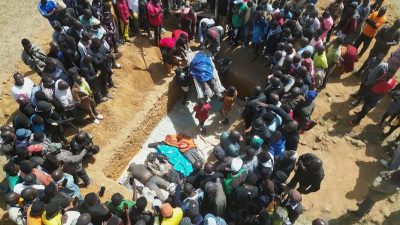
“They entered my son’s room, killed him and his two sons, and cut off his wife’s hand.”
That’s what Mary, an elderly woman in central Nigeria, shared through tears with one of iReach Global’s frontline workers during a recent visit to a village in Plateau State. Her story is just one of many our team heard that day — testimonies of unthinkable violence, devastation, and trauma at the hands of Islamic Fulani militants, whose relentless reign of terror over central Nigeria has intensified dramatically in the past year.
On April 14, 2025, 51 Christians in this village were murdered in a single night. I’ve seen the footage from our team where survivors shared how they awoke to screams, gunshots, and the loss of everything they held dear. Just outside the village sits a mass grave where the victims were buried.
Secretary of State Marco Rubio, in light of the lack of an urgent response from the Nigerian government to the plight of its suffering Christian citizens, should redesignate Nigeria as a Country of Particular Concern (CPC) under the International Religious Freedom Act.
This violence is not hypothetical. It is not incidental. It is targeted, systemic, and growing.
In 2020, Nigeria was rightfully designated as a CPC. Since then, the designation has been lifted — despite the fact that Nigeria remains the deadliest place in the world to be a Christian.
Nigeria had over 3,100 Christians killed and 2,830 abducted last year alone. Over 3.3 million Nigerians are now internally displaced, many of them Christians driven from their homes due to violence.
Muslim extremist groups like Boko Haram, the Islamic State’s West Africa Province, and now Fulani militants have turned Christian villages into battlegrounds. The Observatory for Religious Freedom in Africa reports that Fulani extremists now account for the majority of anti-Christian violence in the region, and their attacks are becoming more organized, more brutal, and more frequent.
These attacks often go unpunished, creating a culture of impunity where persecution flourishes.
During our team’s visit to Plateau State, they distributed survival kits to families left with nothing. One woman named Lami told them, “We were asleep when they forced the door in, came in, and killed my husband and my two grandchildren.” Another leader, Joy, pleaded, “we are calling on the international community to come to our aid.”
We are doing what we can. But large-scale relief and real protection requires international pressure — and moral clarity.
This is not just about aid — it’s about justice. And it begins with the United States speaking the truth.
Although the recent push for sanctions on Nigeria by the House Foreign Affairs Subcommittee on Africa is a start,the State Department has a duty under the International Religious Freedom Act to call out nations that fail to protect the basic rights of their citizens. Nigeria is failing — egregiously. By removing the CPC designation, we’ve sent the wrong signal: that silence in the face of persecution will be tolerated.
It’s time to correct that mistake. It’s time to speak with moral clarity.
The U.S. State Department must act on behalf of Mary, Lami, and the countless others who are suffering in silence. Nigeria must be designated as a Country of Particular Concern. Make it known that America still stands with the persecuted.
Let the world know that what’s happening in Nigeria cannot and will not be ignored.
Clint Lyons is co-founder and executive director of iReach Global, a Christian nonprofit organization dedicated to supporting and empowering persecuted Christians.
















